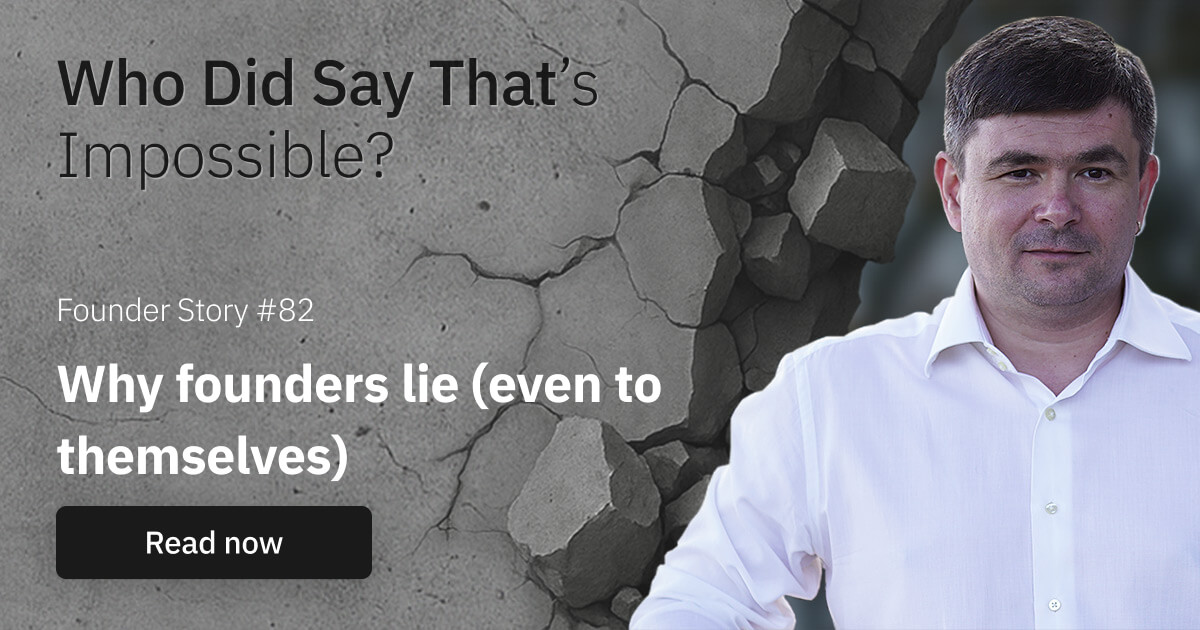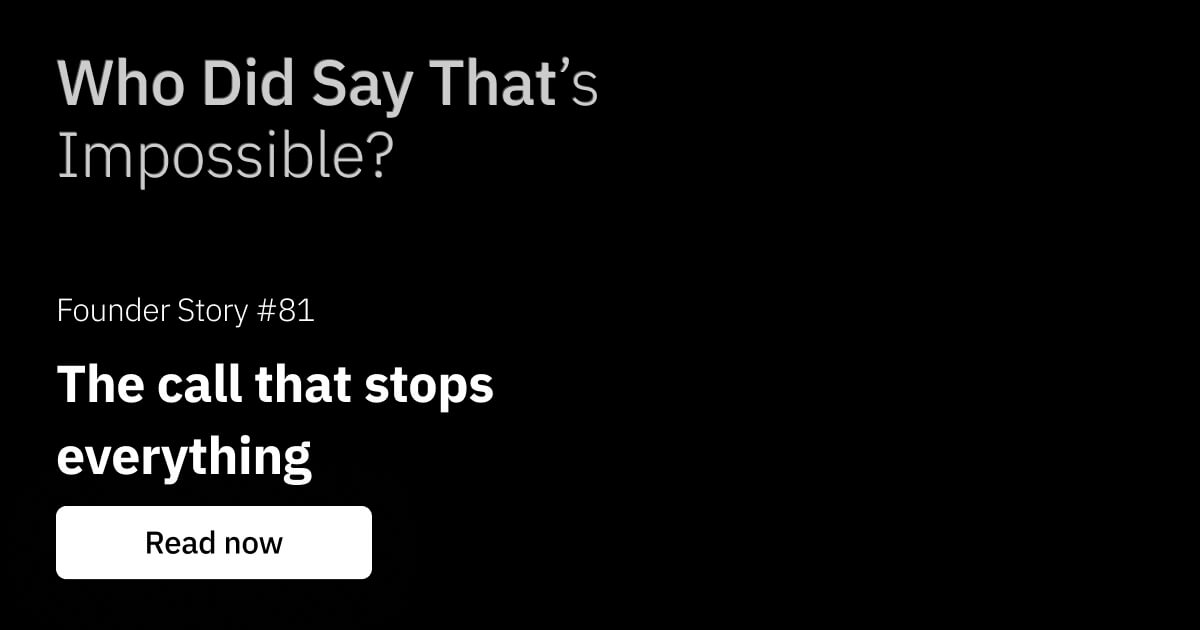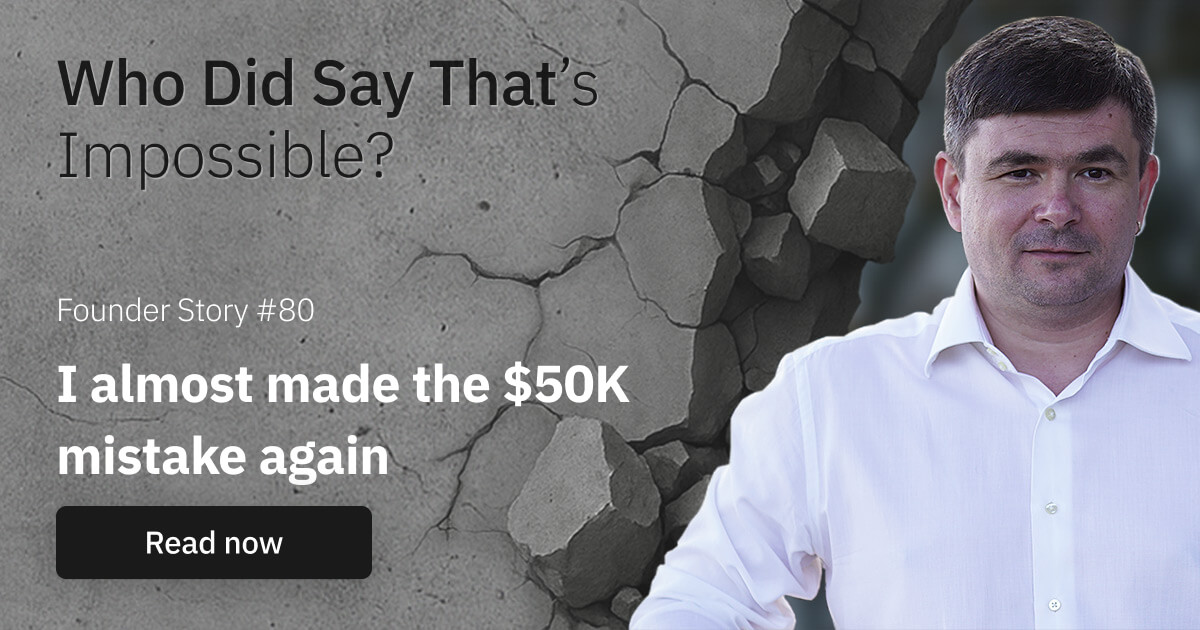Despair — The Entrepreneur's Superpower
Or a minute of “I’m Not Giving Up”
When I started my business, I didn’t even think I was starting a business.
I just didn’t want to work for morons — and I needed to support my family.
All I really wanted was a comfortable space where I could do something meaningful, surrounded by interesting people.
I was always ready to work hard — especially on things that lit me up.
But as the business grew, I started catching myself… envying my own employees.
They had steady paychecks, sane schedules, flexible terms.
I, on the other hand, worked nonstop. The full weight of responsibility was on me.
Sure, I was proud of the team I built. I did everything I could to create the best possible environment.
But inside, frustration was brewing.
Because everything came back to me.
I didn’t come from an entrepreneurial family. I didn’t know how to do it “right.” I learned the hard way.
I truly believed being a founder meant being available 24/7. Being responsible for everything and everyone.
It felt normal. Like that’s just how it is.
Is Stability Not For Founders?
Inside, the doubt crept in.
Is this really the path?
My team lived full lives. And I couldn’t even pick up a hobby.
Something was clearly off.
The turning point for me was reading Robert Kiyosaki’s Cashflow Quadrant.
The idea that a business is a lever — using other people’s time and resources — hit me like a brick.
I started delegating. Production tasks? Easy.
But decision-making, communication, client issues? Still on me.
Delegating Alone Isn’t the Cure
A business is people.
And people leave.
When they did, they walked out with everything they’d learned.
You pour energy, trust, time into them — and then they’re gone.
And you’re left rebuilding. Again.
That’s when it hit me: I was living inside the business.
While my employees were living off the business.
Then came the harsh truth: No one cares about my business the way I do.
Sure, the vibe was good, the culture was nice.
But if a better offer came along — it was goodbye.
And right there, at the edge of burnout, I finally understood: I need to build assets.
Something that doesn’t fall apart when one person leaves.
Something that doesn’t revolve around me.
Step One — Preserve the Knowledge
We started with a knowledge base.
Asked the team to start documenting what they knew.
And… turns out, most people didn’t want to, didn’t know how, or didn’t see the point.
Reminders, requests, even pep talks — useless.
Only the few enthusiasts contributed.
The rest… just ignored it.
Understanding the importance isn’t enough.
You need structure.
You need oversight.
You need motivation.
That’s when we began building our internal operating system.
With our project managers, we implemented a new rule:
- At the start of every project, time is blocked — not billable to the client.
- During that time, team members must document key knowledge.
- The manager ensures it’s done.
- Active contributors get rewarded.
The result was real.
A whole new level of clarity and accelerated growth:
- Knowledge stopped disappearing.
- New team members onboarded faster.
- Documentation became part of our culture.
Not Just Knowledge — Management Too
The success with production systems was inspiring. We started documenting everything.
Hiring, marketing, sales, internal communication — all of it.
We captured every recurring action, every how-to, every “how do we do this again?”
Yes, it took time. Yes, it took effort.
But at some point I realized: I was barely involved in operations anymore.
Managers knew what to do.
Templates, playbooks, processes — all in place.
My role became strategy and high-stakes decisions.
I got my time back.
Time for life.
Time for myself.
Time for hobbies.
It felt strange.
But incredibly satisfying.
Systems take work. They don’t happen overnight.
But the payoff is real.
Despair Isn’t the Enemy
It’s scary, sure.
It eats you alive. Makes you question everything. Can burn everything down.
But.
If you don’t quit.
If you turn that feeling into action.
It becomes fuel for change.
Growth begins with despair.
Because when you’ve hit the wall, when you truly can’t go on, that you finally find the strength to change everything.
Disclaimer.
Every business has its nuances, and every founder has their unique context and resources. Whether or not my advice applies depends on your situation, experience, and needs. But one thing is universal—use your brain.
Think about how to apply the advice in your context before acting.
Your way.
- Eugene
Join the “most offbeat” Businessletter on entrepreneurship.

Hi, I’m Eugene.
20 years later — 80 people, 3 continents, 7-figure revenue.
But for many years, I was the bottleneck in my own business.
Now I help founders escape the same trap. Through systems that actually work, not theory.
I write weekly: operational war stories, decision systems, and lessons learned the hard way.
For founders who want to build without burning out.
More Stories
Founder Stories

Why founders lie (even to themselves)
Or minute of freedom that comes after you exit

The call that stops everything
Or minute of realizing your business isn't ready for this


